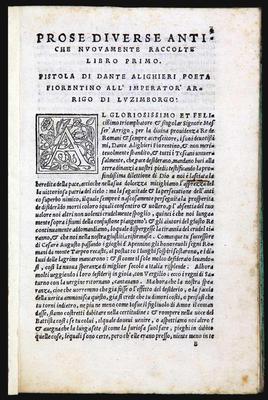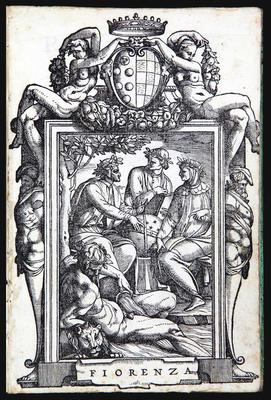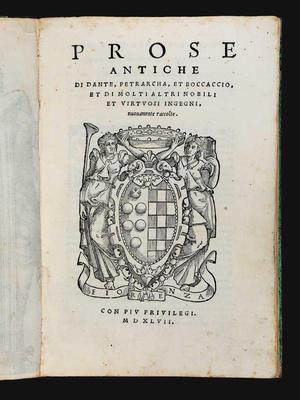Dante Alighieri
Pistola di Dante Alighieri poeta fiorentino all’imperator Arrigo di Luzimborgo, in: Prose antiche di Dante, Petrarcha, et Boccaccio et di molti altri nobili et virtuosi ingegni.
Florence, [Francesco Marcolini] for Anton Francesco Doni, 1 August 1547.4° (213×140 mm). Collation: A-K4. 78, [2] pages. Italic type. On l. A1r woodcut frontispiece depicting Dante, Petrarch and Boccaccio within an architectural border, at the top the Medici arms and below the script ‘fiorenza'. Large Medici arms on the title-page. On l. K4v woodcut printer's device. Woodcut decorated initials. Early nineteenth-century mottled half-calf, spine with gilt title on a red lettering-piece. A very good copy. Frontispiece slightly shaved in the outer margin with minimal loss at the bottom.
Provenance: a barely legible ownership inscription on fol. K3v ('Di Gio. Franc. [?]);Libreria Borella in Bergamo (nineteenth-century label); Livio Ambrogio collection.
First edition of this collection of prose texts and letters, edited by the scholar and polygraph Anton Francesco Doni (1513-1574), active in Florence and Venice as editor and printer in collaboration with Aurelio Pinzi and Francesco Marcolini, and dedicated by the latter to Eleonora di Toledo (1522-1562), Duchess of Florence.The anthology, which includes writings by Petrarch, Boccaccio, Cino da Pistoia, Dino Compagni, Cola di Rienzo and Andrea Dandolo, contains also the Italian translation of two letters, originally written in Latin, which are attributed to Dante.
The first is the famous letter, dated April 17, 1311 and addressed to the Emperor Henry VII of Luxembourg (1275-1313), celebrated by the poet also in the Commedia (Par. xxx, 133-48), in which Dante invites the emperor to re-establish the imperial power in Italy in order to counterbalance the excessive power of Church.
The second letter, probably apocryphal, is addressed to Guido da Polenta, the lord of Ravenna, and is dated 30 March 1314. In it Dante reports on his embassy to the Doge Giovanni Soranzo and harshly criticizes the customs and language of the Venetians.
In the eighteenth and nineteenthcenturies this letter was believed to be a forgery by Doni, but a recent discovery of an older and indipendent manuscript tradition of the text has demonstrated that, if the letter is fake, it was at least forged before Doni.The letter to the emperor was reprinted by Marcolini in Doni's La Zucca (1552); after that, again only in the eighteenthcentury.




